八年级英语一般将来时讲解
初二一般将来时讲解(总7页)

初二一般将来时讲解-CAL-FENGHAI.-(YICAI)-Company One1-CAL-本页仅作为文档封面,使用请直接删除一般将来时讲解一般将来时:一、一般将来时的定义:一般将来时表示将来某一时刻的动作或状态,或将来某一段时间内经常的动作或状态。
常常和表示将来的时间状语连用。
如:tomorrow(明天), next week(下周);in the future(将来)等。
一般将来时由助动词shall(第一人称),will(第二、三人称)动词原形构成。
美式英语则不管什么人称,一律用will。
或用主语+be动词 + going to 动词 .二、一般将来时表示方法:1.用will或shall表示“助动词will或shall+动词原形”这一形式,表示将来发生的事情,用于征求对方的意见或表示客气的邀请。
在口语中will用于所有人称,书面语中第一人称常用shall【其实will也可以用到】。
如:① Tomorrow will be Sunday. 明天就是星期天。
②The rain will stop soon. 雨很快就要停了。
③Shall we go there at five 我们五点钟去那儿4④Will you please open the door 请你把门打开2.用be going to结构表示"be going to+动词原形”用来表示事先考虑过的将要发生的动作以及已有迹象表明必将要发生的某事(有一个先兆),意为“打算;就要”。
如:①We're going to meet outside the school gate. 我们打算在校门口见面。
② Look! It's going to rain. 瞧!快下雨了。
3.用现在进行时表示表示位置转移的动词(如:go, come, leave, start, arrive等),可用现在进行时4.表示将来时。
如:① Uncle Wang is coming. 王叔叔就要来了。
八年级英语一般将来时讲解
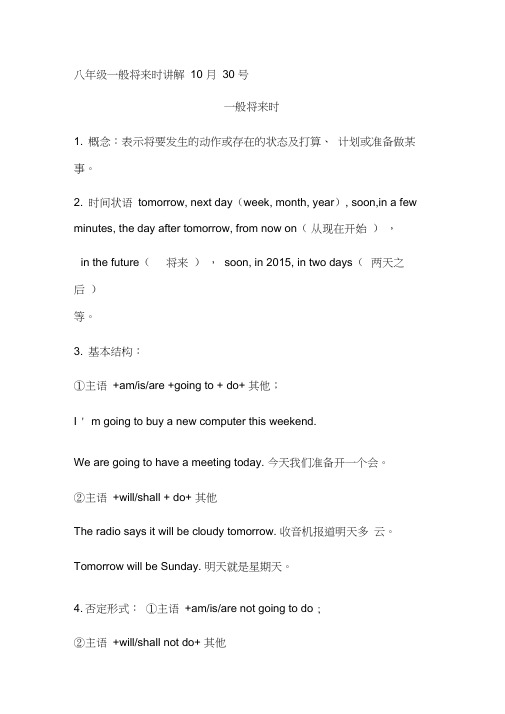
八年级一般将来时讲解10 月30 号一般将来时1. 概念:表示将要发生的动作或存在的状态及打算、计划或准备做某事。
2. 时间状语tomorrow, next day(week, month, year), soon,in a few minutes, the day after tomorrow, from now on(从现在开始),in the future(将来),soon, in 2015, in two days(两天之后)等。
3. 基本结构:①主语+am/is/are +going to + do+ 其他;I ' m going to buy a new computer this weekend.We are going to have a meeting today. 今天我们准备开一个会。
②主语+will/shall + do+ 其他The radio says it will be cloudy tomorrow. 收音机报道明天多云。
Tomorrow will be Sunday. 明天就是星期天。
4. 否定形式:①主语+am/is/are not going to do ;②主语+will/shall not do+ 其他5. 一般疑问句:①be放于句首;②will/shall 提到句首be或will提到句首,some改为any, and改为or,第一二人称互换。
二、讲解一般将来时的 2 种结构① be going to肯定句:主语+be going to+ 动词原形+其他I 'm going to visit the Summer Palace next week.否定句:主语+be+not+going to+ 动词原形+其他I 'm not going to visit the Summer Palace next week.一般疑问句:Be+主语+goi ng to+动词原形+其他?Are you going to visit the Summer palace next week?特殊疑问句:特殊疑问词+be+主语+go in g+to+动词原形+其他?Where are you going to visit next week?1.这种结构表示主体现在打算在最近或将来要做某事。
初中英语知识点归纳一般将来时的用法
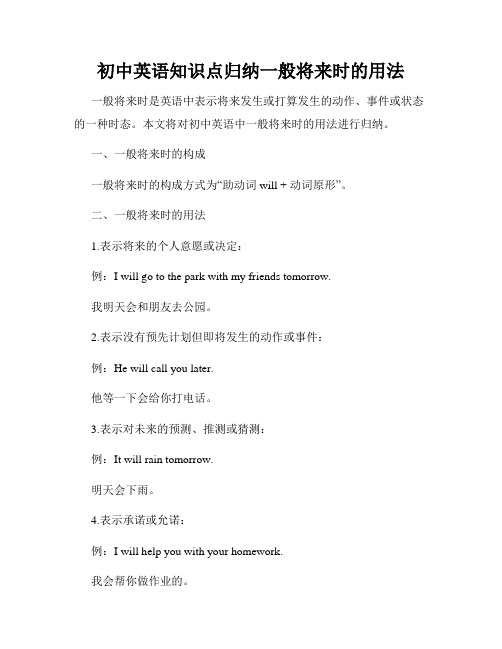
初中英语知识点归纳一般将来时的用法一般将来时是英语中表示将来发生或打算发生的动作、事件或状态的一种时态。
本文将对初中英语中一般将来时的用法进行归纳。
一、一般将来时的构成一般将来时的构成方式为“助动词 will + 动词原形”。
二、一般将来时的用法1.表示将来的个人意愿或决定:例:I will go to the park with my friends tomorrow.我明天会和朋友去公园。
2.表示没有预先计划但即将发生的动作或事件:例:He will call you later.他等一下会给你打电话。
3.表示对未来的预测、推测或猜测:例:It will rain tomorrow.明天会下雨。
4.表示承诺或允诺:例:I will help you with your homework.我会帮你做作业的。
5.表示对现在情况的预测或推测:例:She will be here soon.她马上就会到这里。
6.表示征求意见或征询意见:例:Will you come to the party tomorrow?明天你会来参加派对吗?7.表示习惯性或经常性的动作:例:He will often go swimming on weekends.他经常在周末去游泳。
三、一般将来时的否定与疑问句1.否定句构成:在will后面加not。
例:He will not come to the meeting tomorrow.他明天不会来开会。
2.疑问句构成:将助动词will提到句子的主语前面。
例:Will you pass me the salt, please?请你把盐递给我好吗?四、一般将来时的时间状语一般将来时可以与一些表示将来时间的时间状语连用,如:tomorrow,next week,in the future等。
例:I will visit my grandparents next week.我下周会去拜访我的祖父母。
八年级一般将来时知识点

八年级一般将来时知识点一、一般将来时的概念一般将来时(Simple Future Tense)是指在现在或将来某一时间发生的动作或状态。
它表示将来的事情或者打算、意图、承诺、预测等含义。
在句子中通常用will或shall加动词原形来表示。
例如:1. I will go to the cinema tonight. 今晚我要去电影院。
2. She will be a doctor when she grows up. 她长大后要成为一名医生。
二、will和shall的用法1. 表示意愿、决心等。
例如:I will help you with your homework.我会帮你做作业。
2. 表示承诺或提议等用法。
例如:I shall be there on time.我会准时到那儿。
Shall we go to the park tomorrow?我们明天去公园好吗?3. 在口语中,will常用于表示将来事件。
例如:It will rain tomorrow.明天会下雨。
4. shall在现代英语中已经不常用,一般只在特殊疑问句或回答中使用。
例如:Shall I open the window?我该打开窗户吗?Yes, you shall.是的,你该打开。
三、构成方法形式:will / shall + 动词原形例如:I will go to Paris next month. 下个月我要去巴黎。
He shall be here soon. 他马上就要来了。
注意:一般将来时中,主语部分要与will或shall连用,不可以出现be动词或助动词do/does/did等。
四、常用的表示将来的时间状语1. tomorrow 明天例如:She will be back tomorrow. 她明天回来。
2. next week/month/year 下周/月/年例如:We will visit them next month. 我们下个月去探望他们。
初二英语语法分析--一般将来时用法讲解
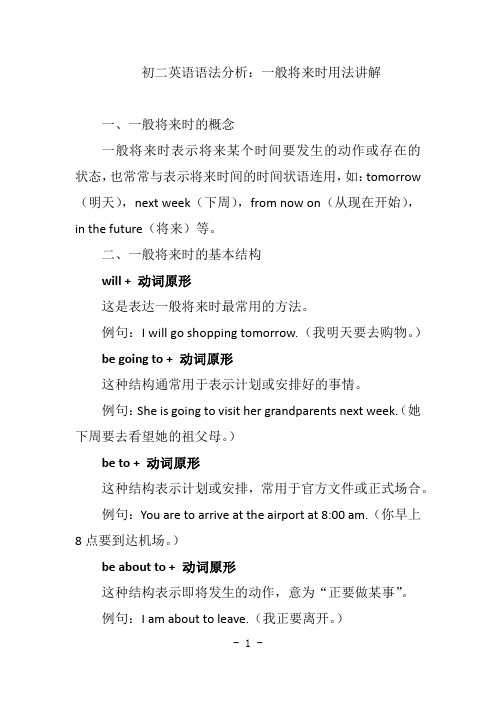
初二英语语法分析:一般将来时用法讲解一、一般将来时的概念一般将来时表示将来某个时间要发生的动作或存在的状态,也常常与表示将来时间的时间状语连用,如:tomorrow (明天),next week(下周),from now on(从现在开始),in the future(将来)等。
二、一般将来时的基本结构will + 动词原形这是表达一般将来时最常用的方法。
例句:I will go shopping tomorrow.(我明天要去购物。
)be going to + 动词原形这种结构通常用于表示计划或安排好的事情。
例句:She is going to visit her grandparents next week.(她下周要去看望她的祖父母。
)be to + 动词原形这种结构表示计划或安排,常用于官方文件或正式场合。
例句:You are to arrive at the airport at 8:00 am.(你早上8点要到达机场。
)be about to + 动词原形这种结构表示即将发生的动作,意为“正要做某事”。
例句:I am about to leave.(我正要离开。
)be due to + 动词原形这种结构表示某事预定或预期将要发生。
例句:The train is due to arrive at 5:00 pm.(火车预定下午5点到达。
)三、一般将来时的用法1表示将来的动作或状态例句:I will buy a new car next year.(明年我要买一辆新车。
)2表示将来的计划或安排例句:We are going to have a picnic this weekend.(我们这个周末要去野餐。
)3表示根据现有情况推测未来的可能性例句:It's going to rain soon.(很快就要下雨了。
)4表示命令、请求、建议等例句:You are to finish your homework before you go out.(你出去之前要把作业做完。
一般将来时态知识点详解(初中英语专项复习) (4)
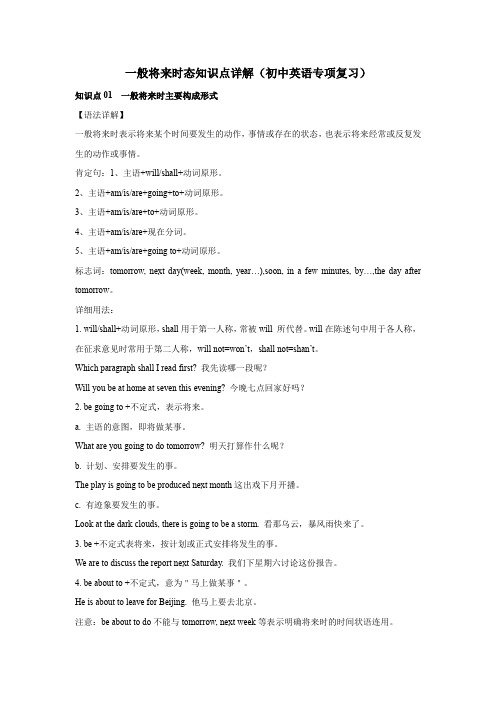
一般将来时态知识点详解(初中英语专项复习)知识点01 一般将来时主要构成形式【语法详解】一般将来时表示将来某个时间要发生的动作,事情或存在的状态,也表示将来经常或反复发生的动作或事情。
肯定句:1、主语+will/shall+动词原形。
2、主语+am/is/are+going+to+动词原形。
3、主语+am/is/are+to+动词原形。
4、主语+am/is/are+现在分词。
5、主语+am/is/are+going to+动词原形。
标志词:tomorrow, next day(week, month, year…),soon, in a few minutes, by…,the day after tomorrow。
详细用法:1. will/shall+动词原形,shall用于第一人称,常被will 所代替。
will在陈述句中用于各人称,在征求意见时常用于第二人称,will not=won’t,shall not=shan’t。
Which paragraph shall I read first? 我先读哪一段呢?Will you be at home at seven this evening? 今晚七点回家好吗?2. be going to +不定式,表示将来。
a. 主语的意图,即将做某事。
What are you going to do tomorrow? 明天打算作什么呢?b. 计划、安排要发生的事。
The play is going to be produced next month这出戏下月开播。
c. 有迹象要发生的事。
Look at the dark clouds, there is going to be a storm. 看那乌云,暴风雨快来了。
3. be +不定式表将来,按计划或正式安排将发生的事。
We are to discuss the report next Saturday. 我们下星期六讨论这份报告。
初中英语一般将来时will和be going to讲解课件

going to, 而多用will。 如:
If any beasts comes at you, I'll stay with you and help you.
1.Bob and I _w__il_l_m__a_tc_h__(watch) an action movie tomorrow.
2.We __w__il_l _b_e____(be) able to go to space in the future.
时间状语:
tomorrow 明天
next week 下周
next month 下个月 next year 明天
before不久
soon 不久
the day after tomorrow 后天
the year after next 后年
the week after next 下下周
基本句型: 肯定句: 主语 + will +v. 原形 否定句: 主语 + will +not + v.原形 一般疑问句: will +主语 + v.原形
3.The childrenw_i_ll_d_i_s_cu__ss__(discuss) the plan after school.
He is seriously ill. He is going to die. He will be twenty years old.
八年级英语一般将来时用法
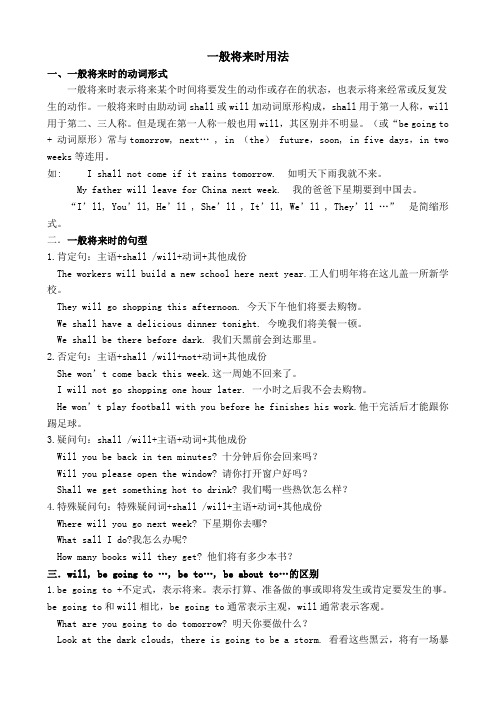
一般将来时用法一、一般将来时的动词形式一般将来时表示将来某个时间将要发生的动作或存在的状态,也表示将来经常或反复发生的动作。
一般将来时由助动词shall或will加动词原形构成,shall用于第一人称,will 用于第二、三人称。
但是现在第一人称一般也用will,其区别并不明显。
(或“be going to + 动词原形)常与tomorrow, next… , in (the) future,soon, in five days,in two weeks等连用。
如: I shall not come if it rains tomorrow. 如明天下雨我就不来。
My father will leave for China next week. 我的爸爸下星期要到中国去。
“I’ll, You’ll, He’ll , She’ll , It’ll, We’ll , They’ll …”是简缩形式。
二.一般将来时的句型1.肯定句:主语+shall /will+动词+其他成份The workers will build a new school here next year.工人们明年将在这儿盖一所新学校。
They will go shopping this afternoon. 今天下午他们将要去购物。
We shall have a delicious dinner tonight. 今晚我们将美餐一顿。
We shall be there before dark. 我们天黑前会到达那里。
2.否定句:主语+shall /will+not+动词+其他成份She won’t come back this week.这一周她不回来了。
I will not go shopping one hour later. 一小时之后我不会去购物。
He won’t play football with you before he finishes his work.他干完活后才能跟你踢足球。
- 1、下载文档前请自行甄别文档内容的完整性,平台不提供额外的编辑、内容补充、找答案等附加服务。
- 2、"仅部分预览"的文档,不可在线预览部分如存在完整性等问题,可反馈申请退款(可完整预览的文档不适用该条件!)。
- 3、如文档侵犯您的权益,请联系客服反馈,我们会尽快为您处理(人工客服工作时间:9:00-18:30)。
八年级一般将来时讲解10月30号
一般将来时
1.概念:表示将要发生的动作或存在的状态及打算、计划或准备做某事。
2.时间状语tomorrow,next day(week,month,year),soon,in a few minutes, the day after tomorrow, from now on(从现在开始),in the future(将来),soon, in 2015, in two days(两天之后)等。
3.基本结构:
①主语+am/is/are +going to + do+其他;
I’m going to buy a new computer this weekend.
We are going to have a meeting today.今天我们准备开一个会。
②主语+will/shall + do+其他
The radio says it will be cloudy tomorrow.收音机报道明天多云。
Tomorrow will be Sunday.明天就是星期天。
4.否定形式:①主语+am/is/are not going to do;
②主语+will/shall not do+其他
5.一般疑问句:①be放于句首;②will/shall提到句首。
注意:
be或will提到句首,some改为any,and改为or,第一二人称互换。
二、讲解一般将来时的2种结构
①be going to
肯定句:主语+be going to+动词原形+其他
I’m going to visit the Summer Palace next week.
否定句:主语+be+not+going to+动词原形+其他
I’m not going to visit the Summer Palace next week.一般疑问句:Be+主语+going to+动词原形+其他?
Are you going to visit the Summer palace next week?
特殊疑问句:特殊疑问词+be+主语+going+to+动词原形+其他?Where are you going to visit next week?
1.这种结构表示主体现在打算在最近或将来要做某事。
这种打算往往是事先考虑好的。
如:
My brother is going to learn English next year.我哥哥准备明年学英语。
I am going to meet Tom at the station at six.我六点钟要到火车站去接汤姆。
2.这种结构还可以表示说话人根据已有的迹象认为非常可能即将发生某事。
如:
Look at these black clouds——it is going to rain.看这些乌云——要下雨了。
I’m afraid I’m going to have a bad cold.恐怕我要得重感冒了。
②shall/ will+动词原形。
肯定句:主语+will/shall+动词原形+其它
I (shall) write to him next week.下周我将给他写信。
否定句:主语+ will /shall+ not +动词原形+其它
They won’t watch TV this evening。
今天晚上他们不看电视。
一般疑问句:will/shall+主语+动词原形+其它
Will you stay at home with us tomorrow ?明天你和我们呆在家里好吗?
特殊疑问句:特殊疑问词(Wh-) +一般疑问句
When will your father be back?你爸爸什么时侯回来?在书面语中,第一人称常用shall,但在口语中,所有人称都可用will.
will 常简略为'll,并与主语连写在一起,如:I'll,he'll,it'll,we'll,you'll,they'll。
一般疑问句如用will you…?其简略答语须是Yes,I will或No,I won't;如用Shall I…?(较少见)其简略答语须是Yes,I shall.或No,I shall not.
1.will/ shall均可表示单纯的将来。
如:The radio says it will be cloudy tomorrow.收音机报道明天多云。
2.表示预料中将要发生的动作或情况。
如:You’ll feel better after having this medicine.吃了这药,你就会感到好些的。
3.will表示人的主观意愿,它带有浓厚的感情色彩。
如:Come earlier tomorrow, or I won’t let you in.明天早点儿来,否则我不让你进来。
4.在问对方是否愿意或表示客气的邀请或命令时,常用will。
如:Will you go to see a film with us?你愿意和我们一起去看电影吗?
5.shall表示建议或征求对方的意见。
如:Shall we go at eight?我们八点去好吗?
6.表示不以人们的意志为转移的规律。
如:He is fourteen this year,and he will be fifteen next year.他今年十四岁,明年十五岁。
PS :will与be going to 的分别
be going to与will的区别
be going to与will两者都可表示将要发生的事、将要去做某事,但
它们有如下几点区别:
1. be going to表示近期、眼下就要发生的事情,will 表示的将来时间则较远一些,如:
He is going to write a letter tonight.
He will write a book one day.
2. be going to表示根据主观判断将来肯定发生的事情,will表示客观上将来势必发生的事情。
He is seriously ill. He is going to die.
He will be twenty years old.
3. be going to含有“计划,准备”的意思,而will 则没有这个意思,如:
She is going to lend us her book.
He will be here in half an hour.
4.在有条件从句的主句中,一般不用be going to,而多用will,如:If any beasts comes at you, I'll stay with you and help you 时
间状语
1)tomorrow, the day after tomorrow, tomorrow
morning/afternoon/evening
2)next year/week/month/hour/day/century
3)in+一段时间
4)in the future
5)this afternoon/Sunday/evening
6)from now on
7)one day, someday(未来的)某天
8)soon。
